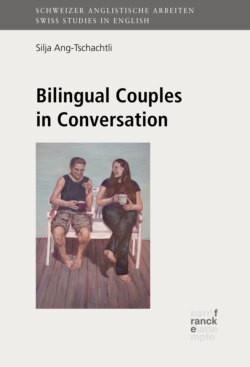Читать книгу Bilingual Couples in Conversation - Silja Ang-Tschachtli - Страница 22
На сайте Литреса книга снята с продажи.
3.2.3.3 Expatriate situation
ОглавлениеThe new living situation that comes with having a partner from a different country is another challenge bicultural couples have to face. In the case of the couples in this study, one of the partners elected to leave his or her home country and move to a new cultural, linguistic and social environmentenvironmentdifferent. These partners may be disadvantaged socially, as they are likely to have fewer friends — at least initially — or less established relationships. In addition, they do not generally have their relatives close to hand and cannot depend on them for support. Foreign partners are often at a disadvantage linguistically, as they are not able to use their mother tongue or may be forced to use their second language in encounters with locals, where lacking language competence may be an issue or drawback. Not being a native speaker of the community languagecommunity language may also lead to a professional disadvantage, or reduce the individual’s choice of jobs, which is often already limited due to their foreign qualifications. In addition, immigrants may also be at a disadvantage culturally, and be obliged to accustom themselves to many elements of their partner’s culture. Rosenblatt explains the cultural struggle of expatriates as follows:
The cultural territory a couple is in can make an enormous difference in the resources available to the partners. Living where one partner’s language, preferred foods, religion, modes of dressing, holidays, types of recreation, etc., are dominant provides enormous resources to one partner and makes him the more competent person in getting around in all sorts of ways. (2009: 12)
Having to deal with these things on a daily basis may lead to psychological problems such as homesickness, insecurity, anxiety, marginalisation, or feelings of incompetence (Rosenblatt 2009: 12). This was also found by Breger (1998), who documented the experiences of 18 mixed couples as well as members of a cross-cultural women’s group and a foreign student club in Germany. Many of the subjects in her study reacted to such difficulties by
withdraw[ing] from what they perceived to be a hostile society, avoiding contact with all groups. This can lead to isolation and depression, and the self-reinforcing feeling of not coping […]. Many people, especially the foreign wives, experienced such depression, which formed a central recurrent topic at the women’s group. (Breger 1998: 149, emphasis in original)
Such feelings of isolation may have been reinforced by the fact that the childrenchildren of these couples were rarely balanced bilinguals, but were inclined towards the community language. As Rosenblatt remarks, children’s language practices often “come to fit the country in which they are living, which further marginalizesmarginalization and undermines the parent who is a cultural and linguistic outsider” (2009: 12). Consequently, the partner in whose home territory they are living is at an advantage in many regards and is likely to be in a stronger position within the relationship.
Living in only one partner’s home environment may create difficulties not only for the partner who emigrated, but also for the local partner, and for them as a couple. In some cases, the local partner has to take on tasks that his or her partner cannot perform, such as doing the taxes or dealing with authorities, banks, builders, or teachers, or has to lend assistance when there is a problem involving communication or a lack of cultural knowledge. Thus, a considerable amount of work can fall to the native speaker. In addition, he or she might have to lend his or her partner extensive emotional support if the latter does not have a large social network. Furthermore, the bicultural couple may struggle to fit into the local community, as can be seen in Breger’s study. Many of the mixed couples she examined had difficulty in being accepted into both local and expatriate communities, and therefore joined or formed societies for mixed couples (1998: 147). The expatriate situation can thus be challenging for both partners as well as their relationship, particularly if the couple is also bilingual, and if the foreign partner is not fluent in the community language.
